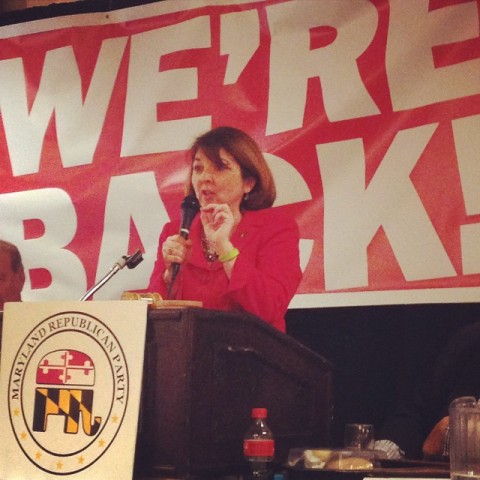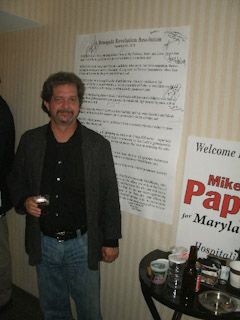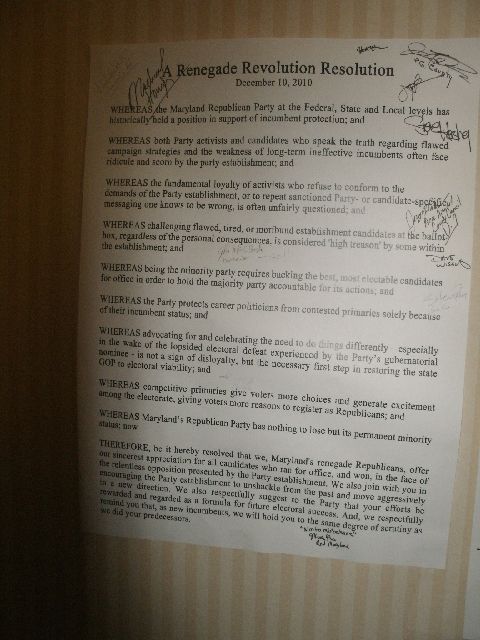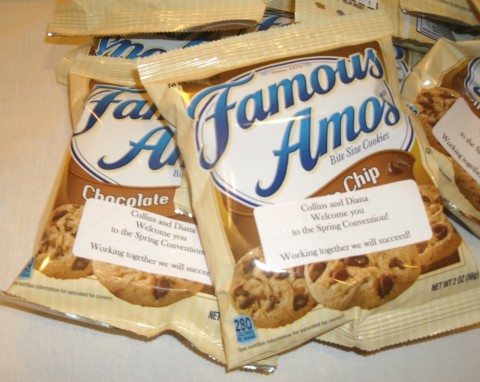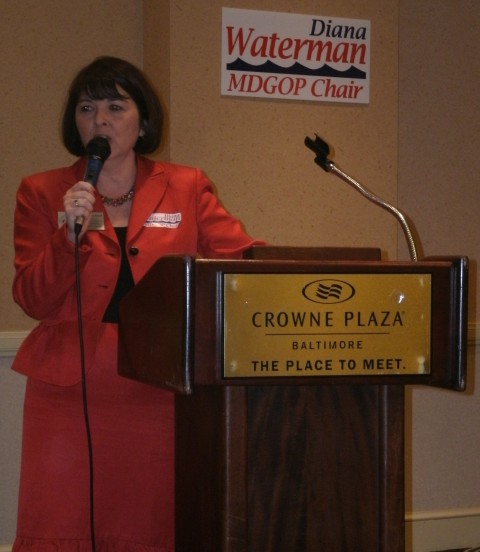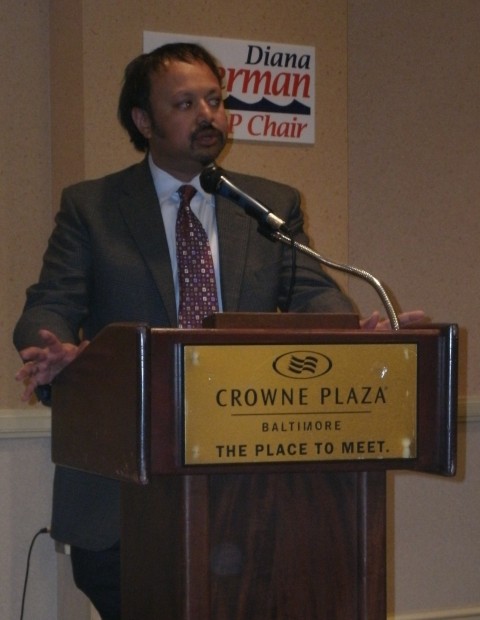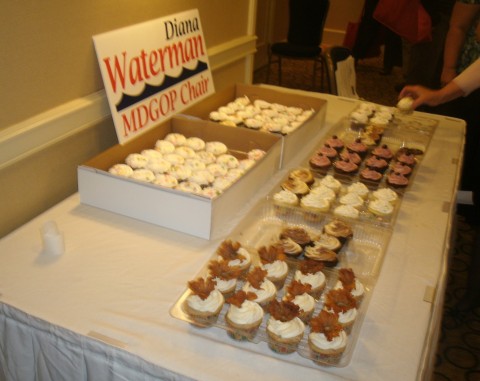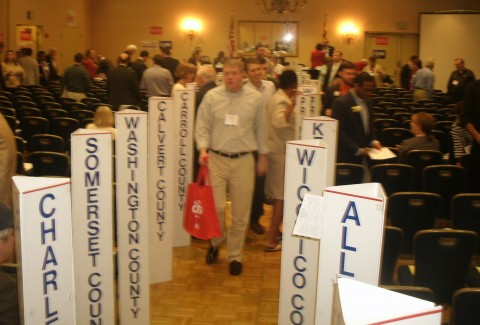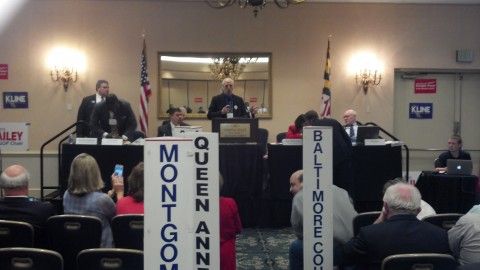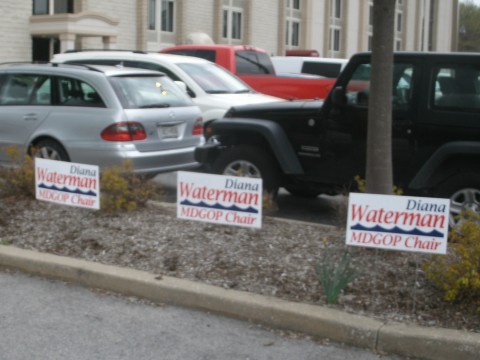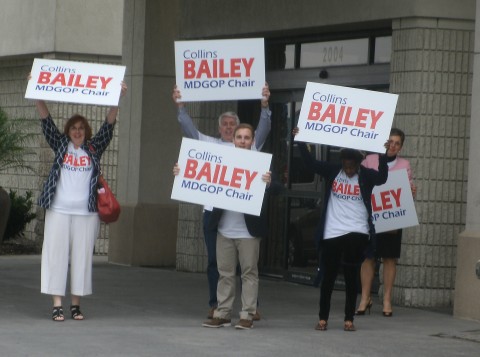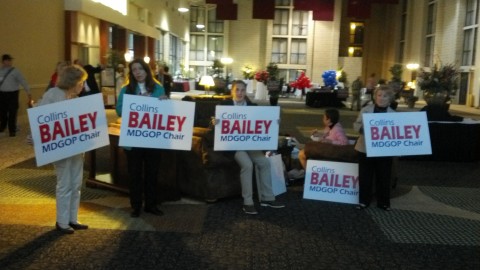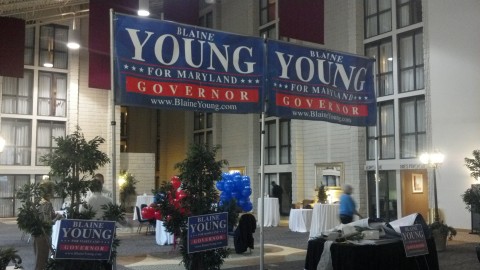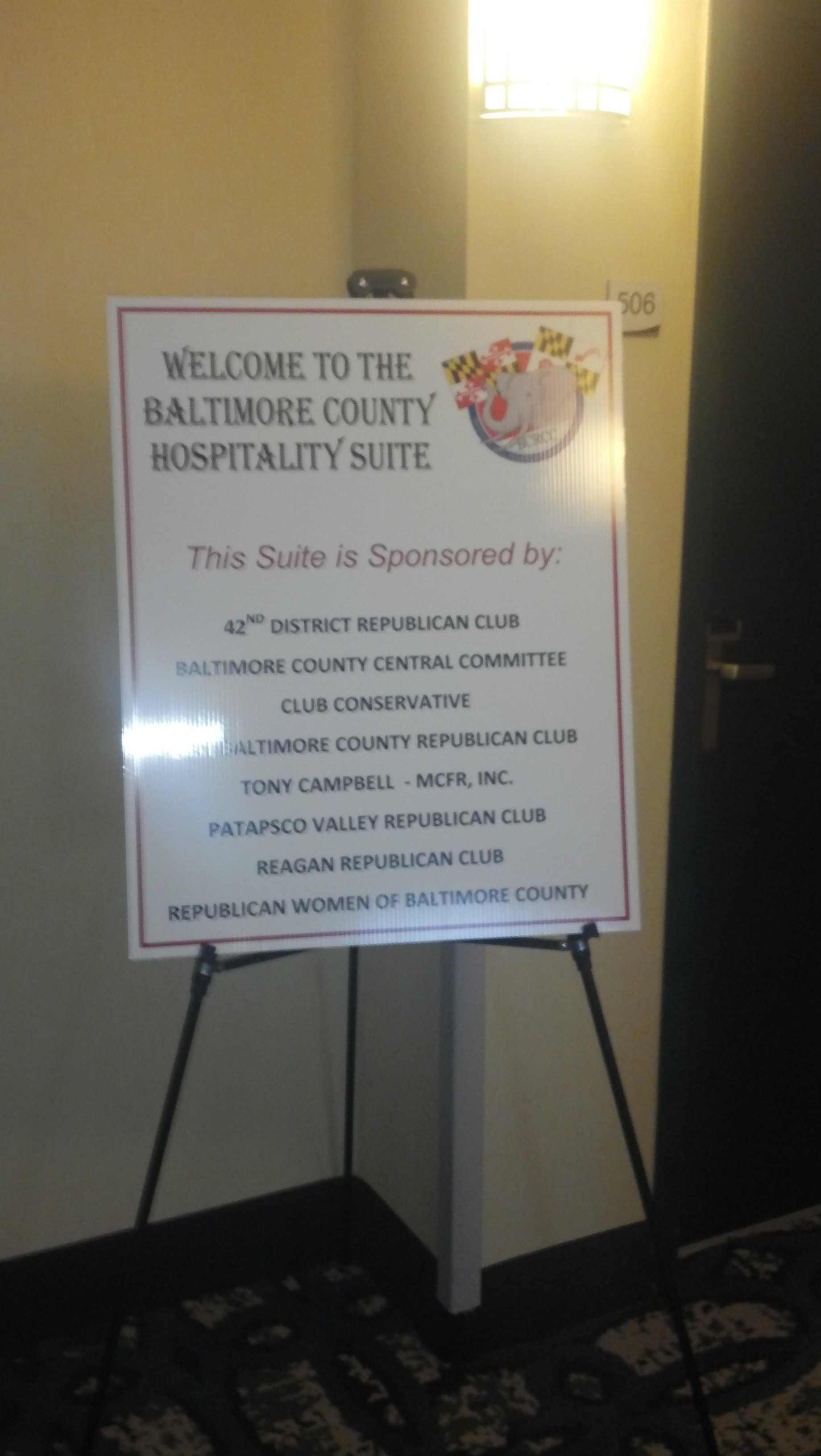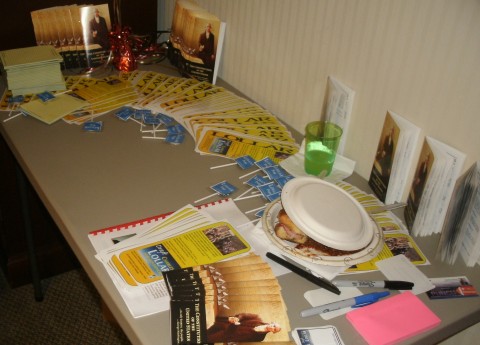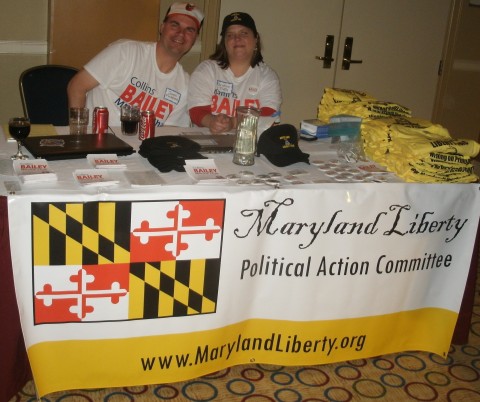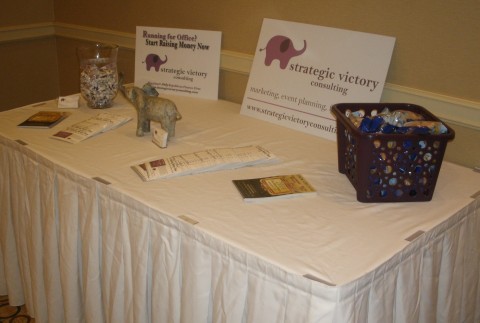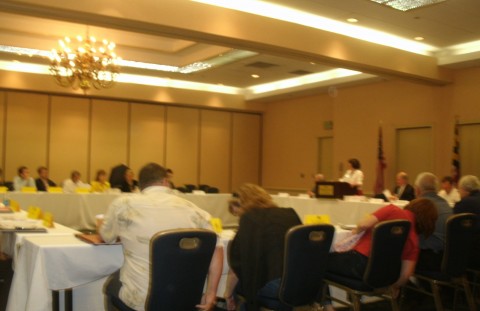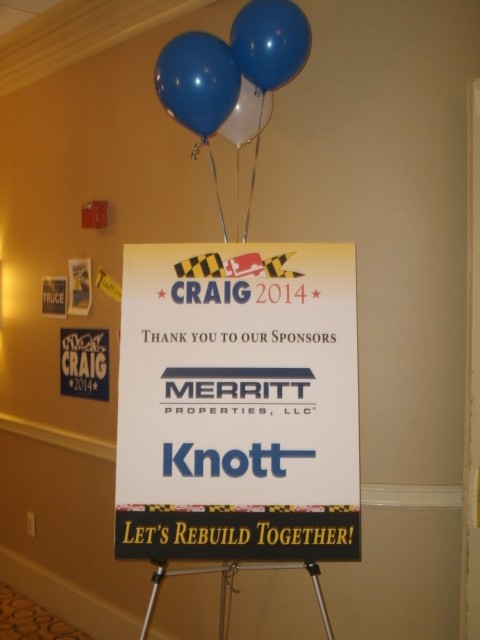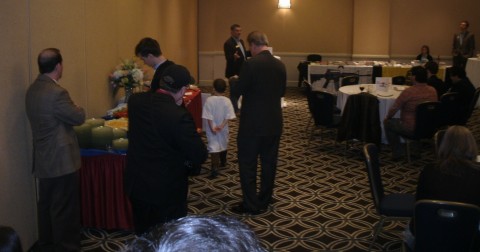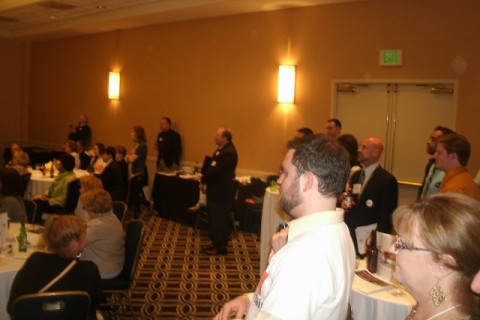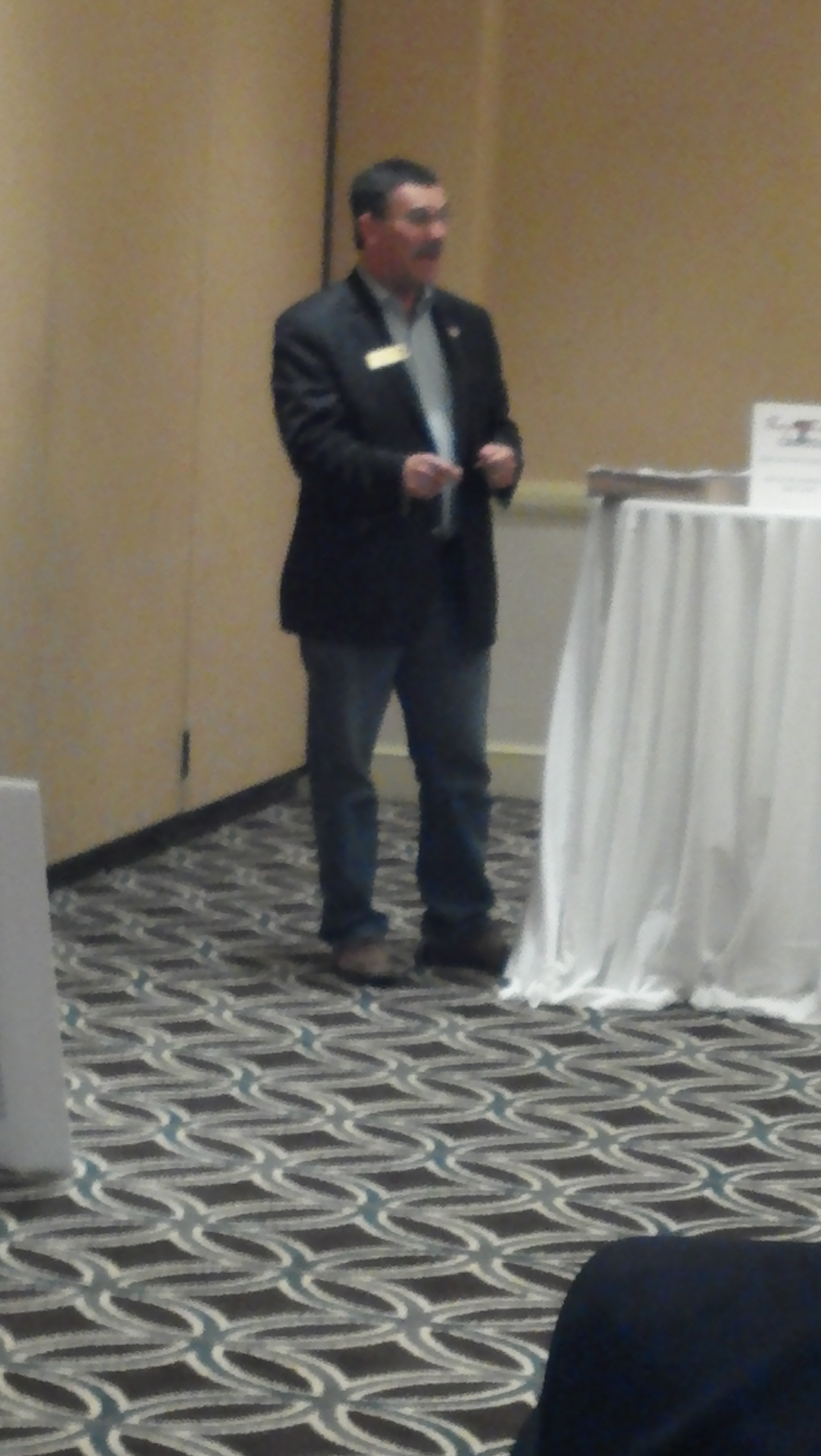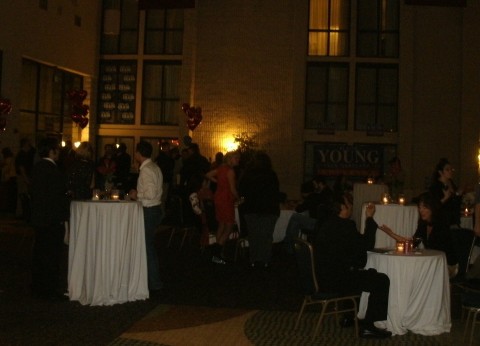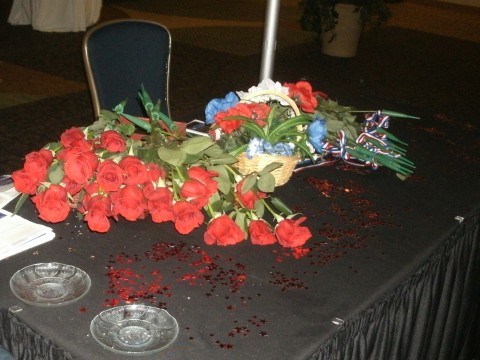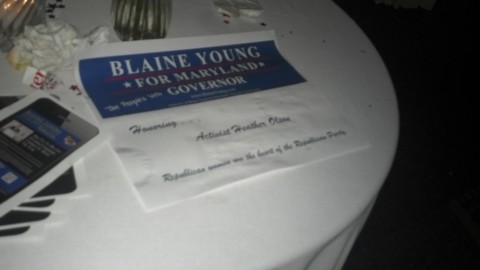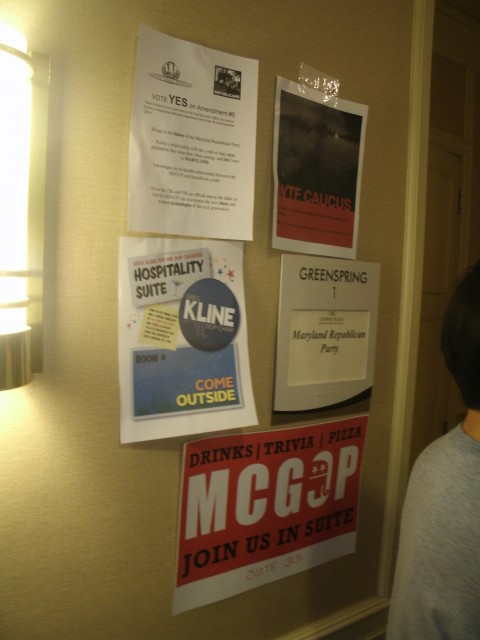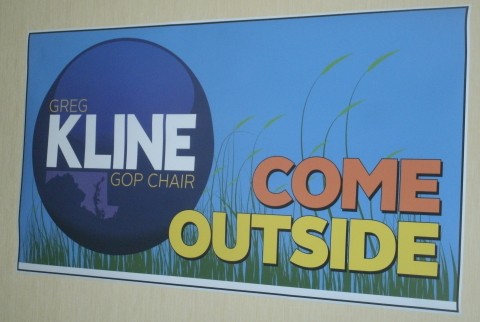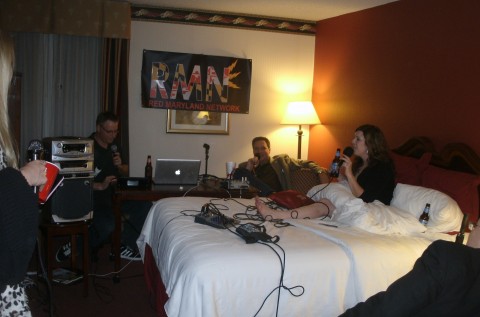The race for Maryland GOP Chair came into a little sharper focus last night as the three candidates stated their case for the last time before they appear at Saturday’s MDGOP Spring Convention.
Collins Bailey, Greg Kline, and Diana Waterman were mainly cordial toward each other but recorded differing priorities for the party in front of a audience of about 30 in the room and untold others online as the event was streamed over the internet. Questions for the trio dealt with a number of issues: Second Amendment, fundraising experience, the role of Central Committee and Executive Committee members, maintaining principles in the face of bad legislation, the independent blogger issue which came up yesterday, Tampa rules changes, gay marriage and the LGBT vote, and whether to compromise principles for unity.
I want to begin with the opening statements. I found it interesting that Greg Kline read most of his from a prepared statement, but departed on one key point: mentioning that the Red Maryland blog came because “good conservative folks…didn’t know what was going on.” Otherwise Kline stuck fiercely to his thoughts that “part of (our) resistance needs to be a functional Maryland Republican Party” but now it has a “leadership culture (which) has become far too insular.”
Diana Waterman, on the other hand, seemed relieved that this was almost over – running this race has been “exhausting.” Her single goal was to “bring balance to the state of Maryland” and “begin to approach a two-party system.” While she had “two worthy opponents,” her key points were the experience she brings and the fact much of her plan is already in place.
Collins Bailey seemed to chafe at the word “opponent.” “We’ll pick a captain on Saturday,” said Bailey. Describing the 2014 election as a “window of opportunity” Collins tried to look at the bright side of what we’ve done in the last two years but found himself wanting. Registering just 39,000 new Republicans out of a quarter-million voters isn’t success, nor is leaving over fifty General Assembly seats uncontested as we did in 2010. We need “measurable, meaningful, and doable” goals for 2014, with the object being to “make it freer and fairer for every Marylander.”
Since no one disagreed that the idea of restricting automatic weapons – a stance held by former RNC Chair Michael Steele – was a bad one, I’m going to skip to the question about fundraising experience.
Greg Kline liked it to having a product to sell, with specific electoral goals he promised to create within 60 days of his election.
Diana Waterman, though, decided to take us back in time and note that she’s fundraised all the way back to when she was a Girl Scout selling cookies, continuing through the parochial school her children attended and up to the United Way. In the here and now, she wanted to get back with former donors.
Fundraising was “a team effort,” said Collins Bailey, and he would approach the problem by finding our party’s most gifted fundraisers and letting them take to the goal of expanding our donor base tenfold. He also made an interesting claim that 80% of what is donated to the MDGOP goes to “overhead.” I suppose that means salaries, rent, and the like – it’s worth making the point on my end that this would automatically go down as a percentage with increased donations.
“If you want a dictator for Chair, don’t vote for me,” explained Collins in his answer to the question on the role of Central Committee and Executive Committee members. Above the others, Bailey saw his role as Chair as a “facilitator.” He would canvass the membership in order to establish a platform and goals for the next election.
Diana Waterman seemed to agree. “There is no successful 2014 without Central Committee members,” she said, hastening to add that, “communications works in both directions.” She wanted to begin a monthly conference call for Executive Committee members to supplement their quarterly meetings, although it might be difficult to schedule.
Greg Kline advocated for an “interactivity leadership,” featuring regular communication between both sides. He also repeated his call for an informal group of advisers, a body he’s previously called a “kitchen cabinet.”
I had written a question regarding the idea of reining in bad legislation as well as keeping our legislators in line with party principles, but the idea was sort of lost in translation in the way it was asked.
So after Collins Bailey answered that “I don’t think that’s an either-or proposition,” Diana Waterman agreed and added that “the state party doesn’t set policy.” (Why not?) Waterman also advocated for a good working relationship with the General Assembly.
Kline took the question to make a point that we should “show our value” to legislators and voters as well as take advantage of the new media.
Just so you know, I think the party should have more in a hand in policy and should use its influence to keep wayward legislators in line.
That answer by Kline, though, seemed to foreshadow the next question, which dealt with the latest MDGOP misplay. I was hoping someone would bring up the fact CPAC screens bloggers for their media credentials, and Greg Kline did when the question was presented to him.
But first we had to listen to Diana Waterman stumble her way through a defense of the decision, which she conceded left “a lot of room for improvement.” She didn’t want to have a subjective judgement or make anyone feel left out, so they decided on the “harsh” standard. In the future she promised to work with the blogging community for improvements.
Collins Bailey didn’t support the decision, but took the question in a different direction. He envisioned conventions being much larger, with up to 10,000 people. He wanted to open conventions up, which would create a “ripple effect” of excitement.
It seems to me from my recollection Virginia has these mass gatherings, and if you have the right speakers it could happen.
Obviously the question seemed tailor-made for Kline, and he didn’t miss the softball. Chiding the “open hostility” of a state party which doesn’t work with new media, Kline pointed out that CPAC and the RNC national convention welcome bloggers and it’s “an embarrassment we haven’t.” His response drew perhaps the largest applause of any of the evening’s answers from those in the room.
The next question was also harshly critical of the interim Chair, for it dealt with the Tampa RNC rules.
Collins Bailey got first crack and assessed that “2012 was a really unfortunate year.” Making the case that under these rules Ronald Reagan would have never been elected, Bailey revealed he felt the election was lost in August once these changes were made over vehement objections. “We’re better than that,” he stated, “Let’s make it right and move on.”
Again, Diana Waterman was thrust into the position of having to defend the unpopular. She launched into a technical explanation of what was changed, mentioning that a couple of the more egregious changes were dispensed with last week in California. These changes, though, were “not taken lightly.”
Waterman also defended Louis Pope, stating she felt his letter didn’t accuse Virginia RNC National Committeeman Morton Blackwell of a “crooked deal” or quid pro quo.
Greg Kline told those gathered they could make up their own minds on Blackwell since he had appeared on Red Maryland Radio. But he also called Tampa “an unprecedented effort to change the rules” and spoke about the Nicolee Ambrose vs. Louis Pope Rules Committee controversy and its role. (Both Kline and Bailey are on record as supporting Nicolee Ambrose for the RNC Rules Committee; Waterman would retain Louis Pope.)
On the question dealing with gay marriage, Waterman leaned on her assessment that the GOP can be an 80/20 party, where people can agree with most ideas and choose to disagree on items like same-sex nuptials. It’s a “polarizing issue,” said Diana. She also bemoaned the fact that resolutions condemning same-sex marriage were included as part of a package at the recent RNC meeting, included with others like the one thanking Ron Paul for his service and supporting other key issues. She also took advantage of the RNC reference to note most of the Ginsburg Tampa rules were defeated.
Greg Kline also stated his support for traditional marriage, but noted “it’s okay to disagree…we have a common purpose.” There’s even a difference of opinion among those at Red Maryland, he continued. Just base our appeals on other issues, he concluded.
Repeating his assessment of the Chair as facilitator, Bailey derided those who would make the party “Democrat-lite.”
“We need to define who we are as people,” added Collins.
Speaking of unity, I thought the last question was excellent. Would you compromise your principles for unity?
None of the Chair candidates took that bait, with Greg Kline opening up by saying “we shouldn’t compromise who we are.” Abandoning our principles won’t help us with voters, Kline argued, and because our principles haven’t been clear, we have a branding problem.
Diana Waterman agreed, adding that we don’t have to bend for unity. We can all still work together.
But the most firm answer came from Collins Bailey. “I don’t believe in compromise,” said Bailey, but he would take incremental success. “Compromise means to give up who you are,” he said. “Are we a social club or a political party?”
Collins asserted the question could be asked in another way: are you willing to destroy who we are for the sake of unity? I know I’m not.
In their closing statements, the trio laid out the final elements of their case.
Greg Kline believed the questions were “really good,” and assessed that “the state party has tremendous opportunities in 2014.” But it also has a lot of problems, he continued, and his goals were to transform the way the party does business and change the leadership culture. He concluded that he saw criticism from places like the new media as opportunities for change, making that case that new media would “spread the message” unlike the Washington Post or Baltimore Sun.
Diana Waterman conceded there’s “definite room for improvement for the party” and that the Tampa rules are “definitely not perfect.” But she agreed with Kline that we have “great opportunities” next year and “fundraising will be the most important thing.”
As he has throughout the campaign, Collins Bailey was complementary to his opponents, saying “I’ve seen growth in all three of us.” The selection, he believed, was a choice in management style and vision.
And since Collins originally thought he only had two minutes, he added a couple anecdotal examples to his remarks about sharing the credit with others but taking the blame for himself. But he also revealed a good friend of his, a Democrat no less, was hoping he’d win. We needed a viable second party, the unnamed Democrat elected official argued, because “the Democrats (in Annapolis) don’t think, they just do what they’re told.”
So until Saturday afternoon, when the candidates make their remarks as their pitch to the convention, this will be the last time the members of the state GOP will get to hear them address questions. Dorchester County Chair Dale Coldren ran a fairly tight ship, which maximized the number of questions heard in a little over two hours.
I leave this for you to judge, but to me it’s worth pointing out that Greg Kline was the first to leave, with Diana Waterman next and Collins Bailey leaving sometime after I did. I happened to come in at the same time Bailey did, so I think he was the first to arrive followed by Kline and Waterman. (Admittedly, that order could be reversed.)
So who do I think won? Well, I would say both Kline and Bailey made the best statements, with each showing strength in various categories. Conversely, Diana Waterman always seemed to be on the defensive and certainly the race and interim Chair job has taken a toll on her. Bailey also mentioned the long hours and time away from family involved.
I’m sure some on the Red Maryland side of things would score this another runaway win for Kline, but I’m inclined to think it’s no better than a draw for him because he got off to a bit of a slow start. But he didn’t hurt his cause, and I think Collins might have helped his own a little bit.
Still, the race would appear to be Waterman’s to lose, and there were some of her supporters crowing yesterday the race was over because Andy Harris endorsed her. But if she can’t otherwise make traction in that district – which includes her home turf – I’m not sure what chance she has if she doesn’t score the first-round knockout.
